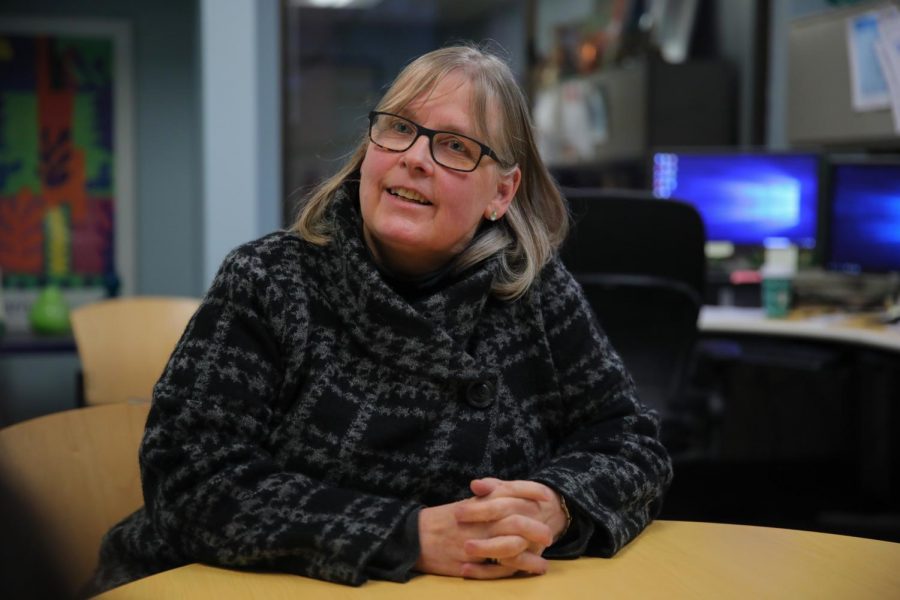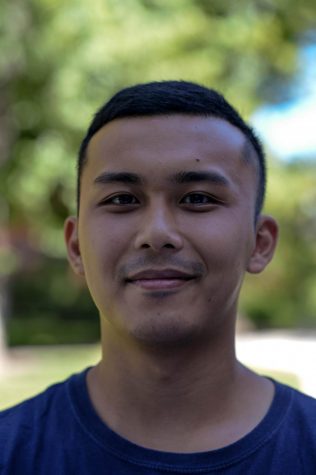Center offers resources for wide range of disabilities
Students do not always make use of available options, director says
BENJAMIN MICHAELIS | DAILY EVERGREEN FILE
Access Center Director Meredyth Goodwin speaks Tuesday in the Washington Building. Although roughly 11 percent of all college students have a disability, Goodwin says only 6 percent of WSU students utilized the center this fall.
November 29, 2018
Since the Rehabilitation Act was signed into law in 1973, WSU has followed its guidelines by providing resources and services to students and employees with disabilities.
About 11 percent of students on college campuses have disabilities, said Meredyth Goodwin, director of the WSU Access Center. However, only 6 percent of students with a disability actually identified themselves to the Access Center in the fall 2018 semester.
The on-campus center provides resources for students with disabilities or chronic medical conditions, while Human Resources Services provides aid to employees with disabilities.
Goodwin said the reason the center exists is to ensure students with disabilities or chronic medical conditions have the same opportunities as every other student on campus.
The Access Center offers alternative testing and print formats, special housing, deaf services, special transportation, assistive technology and note-taking assistance to all students on campus.
“Our goal is to remove the barriers that may interfere with students’ ability to access information, access the physical environment or access ways to assess their knowledge,” Goodwin said. “Students with disabilities may have difficulties going to class or have difficulties to accessing information, so students who need help may use the Access Center to assist them.”
Goodwin said the center is serving about 1,300 students this semester, but the number increases every year. She said she believes the number is increasing because more students who are applying to WSU and students already on campus are starting to become aware of the services the Access Center provides.
“Our largest subpopulation of students with disabilities now are students with mental health problems or psychological issues,” Goodwin said. “Our next largest are students with attention deficit disorder, and that’s considered a learning disability or a mental health issue as well.”
Anxiety disorders are one of the top concerns among college students, affecting about 40 million U.S. adults ages 18 and older, according to the Anxiety and Depression Association of America.
About 12.9 million people in the U.S. between ages 18 and 34 have cognitive difficulties, according to the 2017 U.S. Census Bureau.
Goodwin said the Access Center also helps students with chronic diseases, which include migraines, asthma, irritable bowel syndrome or Crohn’s disease.
She said disabilities affecting college students which the Access Center deals with extend beyond those more commonly recognized such as vision impairment, amputations or deafness.
Sara Stout, director of student services for the Edward R. Murrow College of Communication, said student services works with the Access Center to accommodate students who graduate right out of high school and do not realize the kind of resources WSU provides.
“A lot of the time, students with disabilities do not go to the Access Center to ask for help even if they have the right forms to apply for accommodations,” Stout said. “But after the end of a semester, students start to realize that they needed the help, for example, with taking notes in class or a quiet testing environment.”
In fact, the U.S. Department of Education describes a person with disability as someone who has a physical or mental impairment that limits his or her productivity in a major life activity.
“A disability is defined as a condition that impacts a major life function, and a major life function is to learn,” Goodwin said. “So, people with mental health, anxiety and [post-traumatic stress disorder], for instance, greatly impact the ability for these people to learn.”
Student services and every other college at WSU all follow section 504 and title II, Stout said.
Section 504 is a civil rights law that prohibits institutions from discriminating against people with disabilities in programs that receive financial assistance from the U.S. Department of Education. Title II extends section 504 to state and local governments.
According to the 2017 U.S. Census Bureau, about 194,948 people with disabilities are employed in Washington, while roughly 26,069 of people with disabilities in the state are unemployed.
Goodwin said students often ask her what will happen with their accommodations once they graduate from WSU.
“I always tell my students that once they graduate and move on to the workforce, their workplace will again be covered by the Americans with Disability Act,” Goodwin said. “The employer needs to make sure the employees they hire are accommodated for so that they could do their job.”
The act prohibits discrimination against people with disabilities in employment, transportation, public accommodations, commercial facilities, telecommunications and state as well as local government services.










